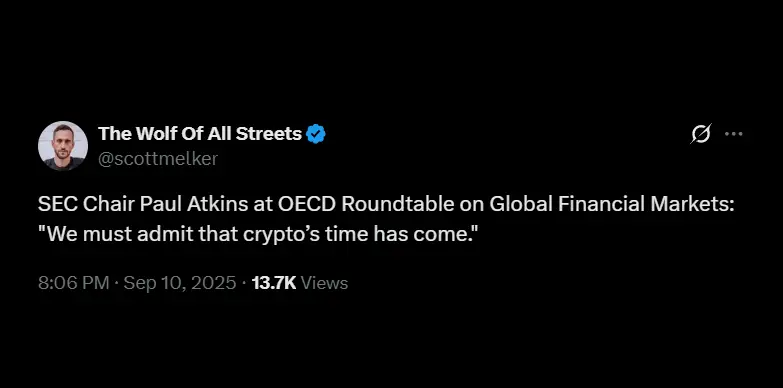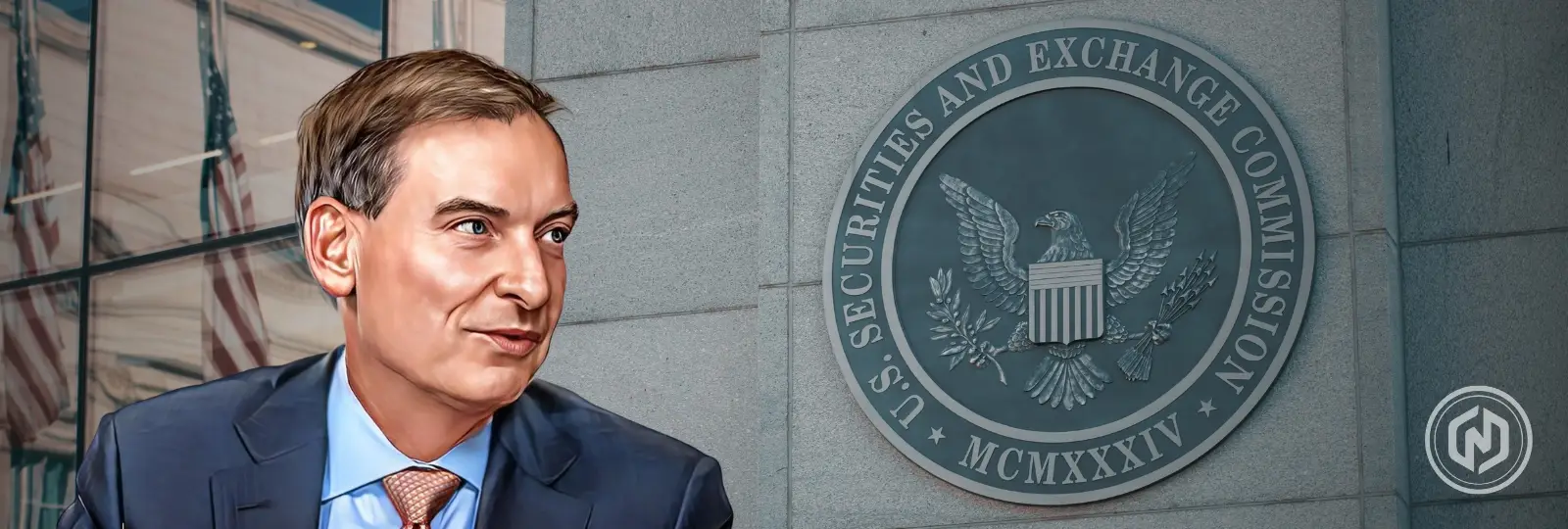Key Highlights:
- SEC Chair Paul Atkins states that “We must admit that crypto’s time has come.”
- Paul Atkins also talks about pushing for a one-license super apps.
- New draft rules regarding crypto are expected to be rolled out by early 2026.
At the first OECD Roundtable on Global Financial Markets, SEC Chair Paul Atkins said that “We must admit crypto’s time has come.” His words indicate that a big change is on the way. Since he has joined the agency, he has been trying to change how the SEC views digital assets and has also shown support for innovation in the industry that ensures market stability and investor protection.

The SEC chair also talked about backing the idea of crypto “super-apps,” which will allow all the essential functions such as trading, lending, staking and custody under one license. The main aim behind this initiative is to simplify regulations, cut costs and support self-custody. This move also indicates that the Chair is ready to bring in innovation within the industry.
Since becoming the Chair of the SEC in early 2025, Atkins has pushed for major changes to boost blockchain and crypto in the U.S. His key initiative includes “Project Crypto,” which focuses on updating rules, giving clarity, and helping the U.S. move closer to its goal of becoming the “crypto capital of the world.”
The SEC’s Spring 2025 Unified Agenda of Regulatory and Deregulatory Actions, which was released on September 4, 2025, proposes almost 20 new rules that are aimed at loosening crypto regulations in the U.S.
The SEC is planning changes that will make crypto trading easier and safer, including exemptions for sales, trading on exchanges and linking with traditional finance. Chair Paul Atkins called it a “new day” focused on innovation, funding, and investor protection. The agenda is also looking at the CAT system so that there are more clearer rules and lighter compliance within the industry to boost markets and crypto growth.
The Evolution Under Chairman Atkins
When Atkins started his leadership at the agency, the SEC was regarded as one of the strictest crypto regulators globally, known for enforcement-driven policies that had created uncertainty for most of the crypto projects and firms in the industry.
After Atkins was appointed, he understood the need for change. Atkins then decided to change these policies and get away from the “shoot-first-ask-questions-later” approach. This indicates that he is more inclined towards advocating for clear, rule-based regulatory regime which is developed through robust public consultations rather than the reactive enforcement.
Project Crypto, which was launched in July 2025, has accepted a new approach. Within this project, there is an SEC-wide effort to update the rules and regulations so that they fit better with the digital assets, on-chain securities, DeFi and tokenized markets. The main aim of the program is to clear the confusion and decide as to which tokens are securities and which are not. It also aims at making rules that are applied for crypto sales, trading and storage simple.
One of the most consequential insights from Atkins is his categorical statement that “most crypto tokens are not securities,” directly affecting popular tokens like XRP, ADA, SOL, and DOGE. This reassessment reduces the SEC’s jurisdiction and is aiming to reduce legal ambiguities that have long hampered innovation and fundraising in the crypto space.
What to Expect Going Forward?
The SEC is currently preparing draft rules on crypto trading, custody and offerings which might be rolled out by early 2026. The agency is also considering lightening the current rules for startups via an “innovation exemption.” Clearer guidance could also open doors for products such as spot crypto ETFs, staking options, and DeFi investments. The agency is also planning to modernize the trading rules for tokenized assets, maintain strict investor protections against fraud, and work with global regulators to support cross-border crypto finance.
Also Read: XRP to the Moon: Banks’ SWIFT Adoption Won’t Stop the Surge


